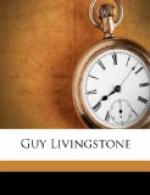“‘Be sure your sin will find you out.’ It is thirty years since I heard that text; I forgot it the same day, and never thought of it again till now. There may be truth in that. It hunted her to her grave, and it will not leave her in peace even there. And yet she suffered enough to make atonement. She tried not to let me see how much, but I did see it; I watched her dying for a year and more. I am sure she is an angel now. I like to think so, though I shall never see her again. I would not believe otherwise if a thousand priests said it and swore it; for I never moved from her side, after she was dead, till I saw the smile come on her face. She must have been happy then; do you not think so? They would hardly have gone on punishing her forever. It was all my fault, you know.”
He gazed at Livingstone anxiously, almost timidly. Guy bowed his head in assent, but he could not find words to answer just then. There was something very terrible in that opening of the flood-gates when a life’s pent-up remorse broke forth.
“I think you will end better than I have done,” Mohun went on, “though you are going down-hill fast now. But I have no right even to warn you. Only take care—” He broke off suddenly, and roused himself with an effort. “I shall go home and dress now, and get through what little I have to write, and then lie down for an hour or two. Nothing makes the hand shake like a sleepless night. I’ll call for you in good time.” So he went away.
Livingstone sat thinking, without ever closing his eyes, till Mohun returned. The latter looked fresh and alert; he had slept for the time he had allotted to himself quite calmly and comfortably; the old habits of picket-duty had taught him to watch or sleep at pleasure.
After Guy had made a careful toilette, at the special request of his principal they started, and in forty minutes were on the ground. Levinge and his second, with the surgeon, arrived almost immediately; the former stood somewhat apart, keeping the lower part of his face carefully muffled.
It was a dull, chill morning; the sky of a steely-gray, without a promise of a gleam from the sun, which had risen somewhere, but was reserving himself for better times. There was a sort of desultory wind blowing, just strong enough at intervals to bring the moist brown leaves sullenly down.
After the pistols had been scientifically loaded, the seconds placed their men fifteen yards apart—with such known shots it was not worth while shortening the distance.
The sensations of ordinary mortals under such circumstances are somewhat curious. Very few are afraid, I think; but one has an impression that one’s own proportions are becoming sensibly developed—“swelling wisibly,” in fact, like the lady at the Pickwickian tea-fight—while those of our adversary diminish in a like ratio, so that he does not appear near so fair a mark as he did a few minutes ago. But, with all this, there is a quickening of the pulse not unpleasurable—something like the excitement of the “four to the seven” chance at hazard, when you are backing the In for a large stake.




